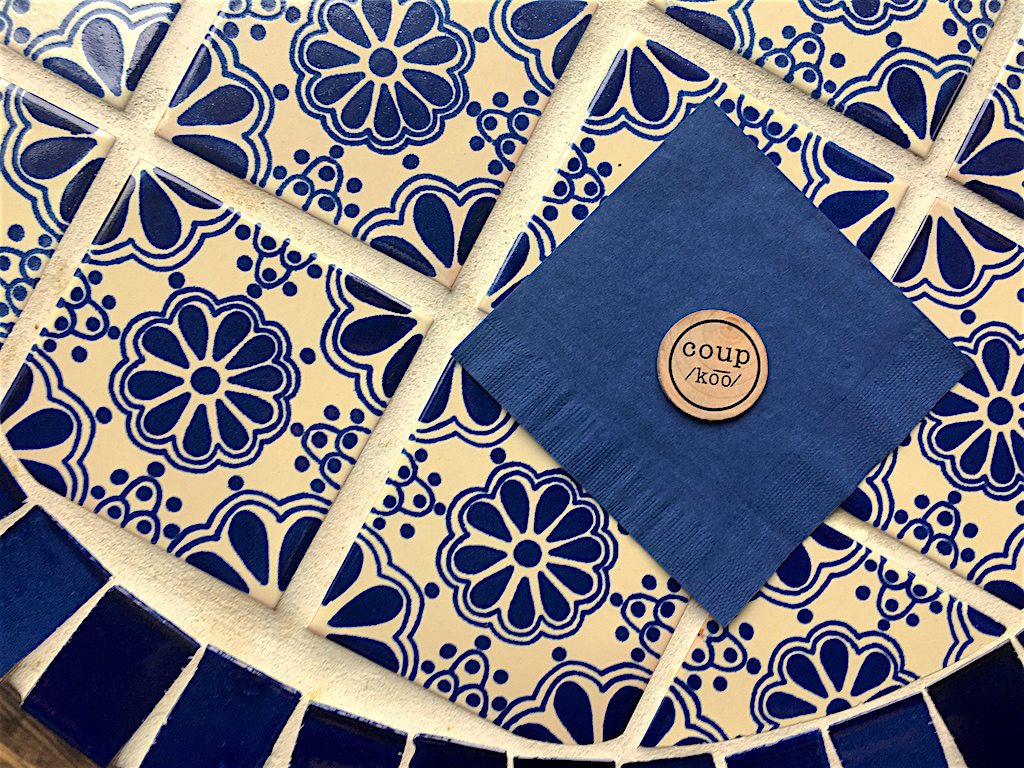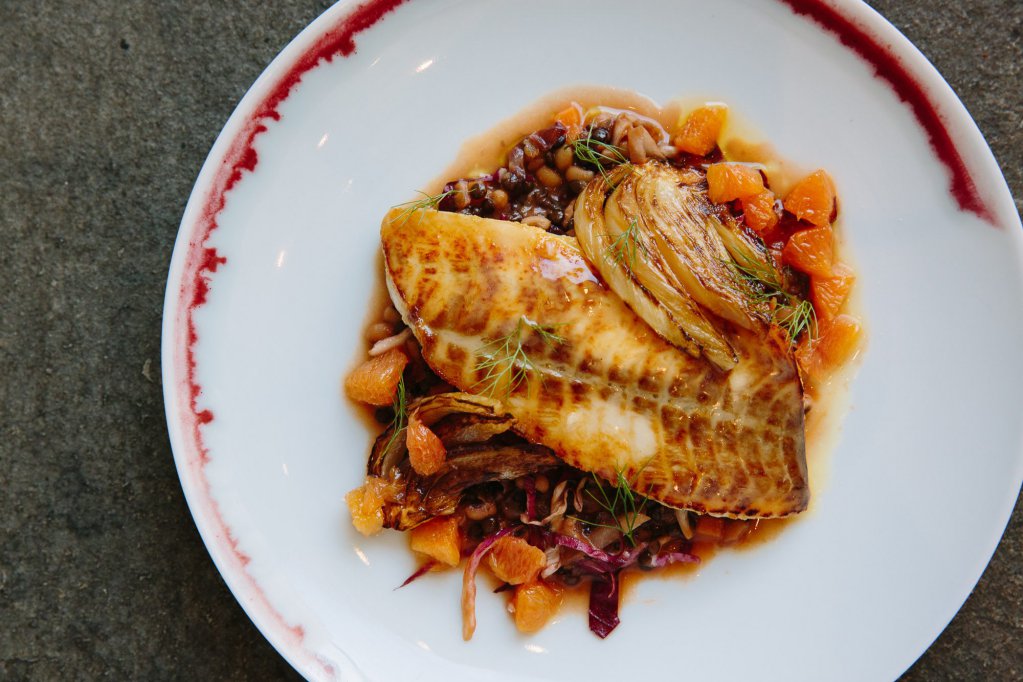
Claire Brown
On November 8, 2016, Hillary Clinton soundly won New York state’s vote—59 percent to Donald J. Trump’s 36.5 percent. It wasn’t a surprise: New York hasn’t voted for a Republican since Ronald Reagan in 1984. And on the island of Manhattan, where blue has pretty much always been the new black, Clinton won by more than 88 percent.
Three months later, smack in the middle of the same island in Cooper Square, near Astor Place, the warm, wood-walled seafood restaurant Bergen Hill, co-owned by Ravi DeRossi (owner of 15 New York City restaurants and bars, including super-chic cocktail scene mainstays Amor y Amargo and Death & Co.) and Daniel Kessler (guitarist for the band Interpol) closed.
At first glance, these two events appear unrelated. And on the surface, they are. But in truth, both happenings—the first, somewhat unprecedented and the second, a common occurrence—have collided into a new cultural phenomenon we’ll call “drunktivism.”
 Claire Brown
Claire Brown Bergen Hill was quickly replaced by a cocktail bar named Coup (co-owned by DeRossi and barmen and mixologists Sother Teague and Max Green), which opened in Manhattan on Friday to a line of more than 40 people waiting outside, donates 100 percent of its profits to charities that can loosely be categorized as part of “The Resistance.” To be explicit: that means the anti-Trump-administration resistance. What charities qualify? “Organizations that are really in danger and need our help to fight,” says Coup’s manager Aly Kravetz.
Here’s how it works: Cocktails and wine are priced at a flat rate of $20 (special guest bartender creations start at $25). Each drink comes with a “Coup coin,” which guests drop into a vase that corresponds with their cause of choice. At the end of the night, staff members count and tally the tokens. Then, once bills and staff salaries are paid (no tips here: employees are hourly, and tax and gratuity are included), profits are divided among the charities based on the proportion of tokens they received. The recipient list rotates every seven days.
In Manhattan, it’s pretty easy to drop $20 on a cocktail. At niche bitters tasting room Amor y Amargo (where Green has been senior barman), drinks will cost you $15 before tip. But at Coup, nightlife dissenters can, in Teague’s words, “take a sip and take a stand, give and partake.” And that’s a buzz that comes with benefits for drinkers in this longtime Trump-tolerating city, host of recent large-scale protests like the women’s march, and where anxiety over the fate of immigrant residents (and workers) have citizens picketing near daily in front of Trump-owned properties.
In short, this concept works here because it’s here; now seems a particularly good time to open a bar adorned with slogans on the wall that include “the pilgrims were undocumented” and “no, you cannot take my rights—I’m still using them,” drawn on butcher paper with a pencil and paint markers by Raines Law Room bartender and artist Natalie Czech.
https://www.instagram.com/p/BSwA9UYh5vL/?taken-by=coupnyc
Though DeRossi didn’t start hiring for Coup until two weeks before opening day and its relevance seems tied to the length of the current administration, don’t call it a pop-up protest. DeRossi says the partners are pursuing non-profit status for the establishment, a process that can take more than a year.
The idea for a non-profit bar had been in the back of Teague’s mind since he visited Okra in Houston, a saloon that donates all its profits to charity, and DeRossi says the concept for Coup came together at 4:00 in the morning over drinks. But Teague he says the political angle was all DeRossi, who has been flirting with gastronomic advocacy since early 2016, when he decided to further his commitment to animal rights and environmentalism by gradually eliminating animal products from the menus at all 15 of his establishments. In July of last year, DeRossi reopened his first venture, The Bourgeois Pig, as all-vegan tapas joint Ladybird, and he claims food sales have doubled at his tiki spot Mother of Pearl since it went meat- and dairy-free last February.
Indeed, seafood-centric Bergen Hill’s closure had everything to do with DeRossi’s commitment to veganism. “About a year and a half ago, maybe longer, I made the decision that I didn’t want to be involved in the meat or dairy industry anymore,” he says. “I had signed the deal to open up Bergen Hill prior to making the decision to go one hundred percent plant-based. We did really really well, and it was packed every night, but it was weighing on me just because of the devastation that’s going on with the oceans and all the pollution—the overfarming, the overfishing.”
When we visited on Monday after opening weekend, Coup was collecting donations for the ASPCA—perhaps a pet project (both literally and figuratively), since we can’t remember anyone in the Trump administration threatening stray puppies.
But DeRossi is a savvy businessman, and the Bergen Hill space wasn’t going to stay vacant for long. “I knew that I was going to keep it because I had just spent a fortune building out this beautiful restaurant—I had the license, the liquor license, but I didn’t know what was next.” (If you are wondering, the kitchen won’t go to waste. DeRossi says he’s planning to develop a food menu for Coup in the near future.)
Coup’s quick come-up (less than three months elapsed between Bergen Hill’s closure and the bar’s opening night) is due in no small part to the fact that DeRossi was already operating in the space. He didn’t have to negotiate a lease, remodel, or even redecorate beyond the protest slogans on the walls. And his team had so many of the cocktail community’s big guns at its fingertips: Who else could wrangle up guest appearances from New York Times journalist Robert O. Simonsen, author David Wondrich, and name-recognition mixologists from around the country in a matter of days?
Kravetz estimates the bar raked in $15,000 in its first weekend. “We did great, man. We slaughtered it,” says Teague. But Coup’s long-term sustainability may lie beyond bar tabs, in hosting events for groups with an agenda. Kravetz says the Young Democrats, for instance, recently inquired about hosting a happy hour at the bar, after getting turned down at other bars that didn’t want to host politically-tinged parties. “We are the exact opposite,” she says. “We’re more than happy to blast on social that we’re hosting a party for the Young Democrats.”
To be clear, party affiliation that favors the color blue isn’t necessarily the point. Coup patrons don’t have to be partisan as much as they have to want to support a cause. That’s not to say that charity selections couldn’t theoretically favor one of the political parties if Coup’s staff or guest bartenders decided that was important. But for now, profits from donor drinks seem designated to support groups that have been particularly under threat of losing their funding since President Trump took office.
DeRossi sees Coup as his contribution to the grassroots efforts that have swept the nation in recent months. “I wanted to do something, given this divisive climate. Then it hit me: Opening bars is what I do. How do I turn that into a positive?” he says. “A lot of people want to do something, but they don’t know what to do. If it’s as simple as, well, we were gonna go out drinking anyway, why not go to Coup?”











